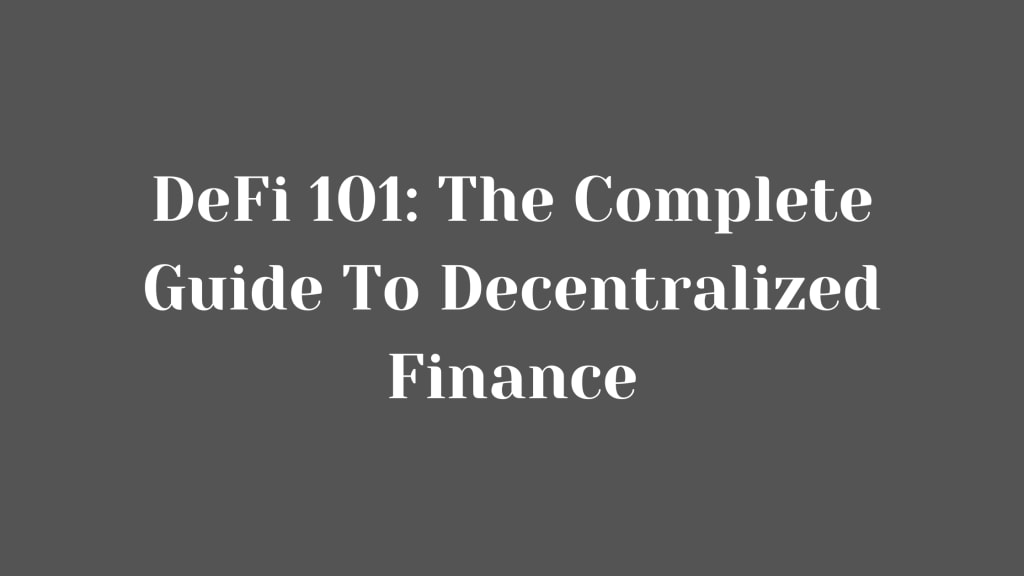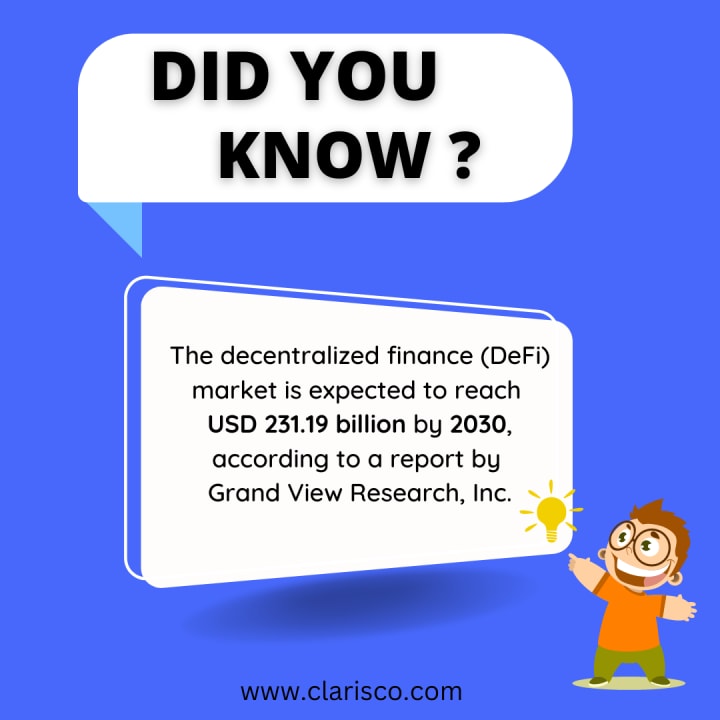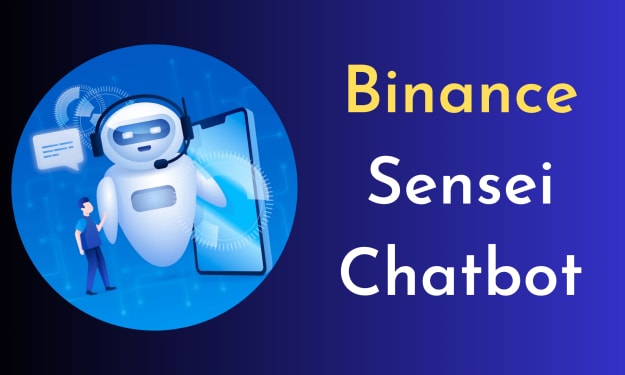DeFi 101: The Complete Guide To Decentralized Finance
DeFi is likely to have a significant influence on the future of banks and how financial institutions operate on a macroeconomic level. So what does this all mean for businesses and entrepreneurs in the fintech space?

There's no doubt that decentralized finance (DeFi) is a hot topic in the fintech world right now. Experts believe that this emerging financial technology has the potential to transform the global financial landscape as we know it. DeFi is likely to have a significant influence on the future of banks and how financial institutions operate on a macroeconomic level. So what does this all mean for businesses and entrepreneurs in the fintech space?
Well, it's clear that DeFi is a powerful force to be reckoned with and one that should be on every fintech company's radar. As per Grand View Research, the global DeFi market size was valued at $11.78 billion in 2021 and will grow at a compound annual growth rate (CAGR) of 42.5% from 2022 to 2030. DeFi is constantly evolving, with new projects and protocols being launched all the time. This means that there are plenty of opportunities for growth and development in this space.
Decentralized finance has gone mainstream. Every investor seems to be curious about it. But, what is Decentralized Finance though? In order for us to understand everything about DeFi and how to get started, we need a basic definition first.
What is DeFi?
Imagine a world in which money could be sent peer-to-peer, directly between people, opening up entirely new financial possibilities to the 1.4 billion unbanked population. That's exactly what Decentralized Finance (DeFi) is all about. DeFi is an alternative to the more traditional financial system, known as 'TradFi.' With DeFi, users have more control over their funds as it is decentralized. This means that control is distributed among those who use the system, as opposed to one central institution, like a bank.
DeFi refers to products and services that anyone can use as long as they have an internet connection. It works without the help of banks or other third-party firms. The decentralized financial market is always active, so transactions happen 24/7 in real-time. You can store your crypto on computers, in hardware wallets, and in other places as you wish. You can access it anytime you want to.
How Does DeFi Work?
Decentralized finance uses the blockchain technology that cryptocurrencies use to track assets and transactions securely. The transactions are recorded in blocks on the blockchain and subsequently validated by other users. If these verifiers approve a transaction, the block is closed and encrypted, and a new block with information about the preceding block is generated. The blocks are "chained" together by the information in each subsequent block, thus the name blockchain. Because the information in prior blocks cannot be modified without impacting subsequent blocks, there is no way to modify a blockchain. This notion, together with other security procedures, ensures the security of a blockchain, and hence DeFi.
Though DeFi is often associated with cryptocurrencies, it extends beyond the production of new digital money or value. Because there are no intermediaries to allow transactions for DeFi apps, there are no banks or institutions to handle your money. Furthermore, the code is subject to review by anybody, fostering a sense of transparency in DeFi protocols. Users have access to a wide range of applications (known as DApps), the majority of which are developed on the Ethereum blockchain. Decentralized applications otherwise known as "dApps" or "DApps"—are digital applications that utilize a blockchain network of computers as opposed to a single computer.
Did You Know?

What Are the Key Traits of Decentralized Finance Applications?
1. A Distributed System
The interest rates and currencies in a decentralized system are determined by data and algorithms that are not controlled by any central authority.
2. Minimal Human Interference
DApps are built on a decentralized network of computers that use smart contracts to automate transaction processes, rather than human intervention. This system allows for greater efficiency and transparency, as well as reduced costs.
3. Open Source Code
Since most DeFi apps' code is open-source, anybody can inspect it and confirm its functionality, security, and features. This increases the code's stability and dependability because all users are constantly aware that the applications aren't secretly executing malicious code or stealing user data.
4. Truly Inclusive
Being an open-source platform, dApps are really inclusive to all people and lack any bias or even border controls. The Decentralized Finance community is open to anybody in the globe with a computer and internet connection. The creation of a completely borderless economy is DeFi's ultimate goal.
5. Unrestricted
Neither developing a DeFi app nor utilizing one requires authorization from anybody. So you no longer need to rely on the extensive regulatory verification mechanisms required by the traditional banking system in order to participate in the global economy thanks to this platform. DeFi is frequently referred to as "open finance" because of how flexible and open it is.
6. Leeway in Development
Leeway in development: Users can securely connect external apps via a dApp for specific functionalities as appropriate, giving developers more liberty. Even more intriguing is that users have the ability to design their own interfaces if the ones provided do not meet their needs.
The Importance of Smart Contracts in DeFi
In addition to more complex features like derivatives (leverage, swaps), and crypto-asset trading (decentralized exchanges), smart contracts can facilitate simple features like payment (Stablecoin) and credit (lending/borrowing) that are fully automated and decentralized. Smart contracts are special in that they programmatically carry out a set of if-then rules without the intervention of a third party. Because neither party has authority over the execution or enforcement of the agreement, smart contracts diminish counterparty risk (the possibility that one party to a transaction or agreement will fail to fulfill its contractual obligations).
Consumers of centralized financial institutions, such as a bank or credit unions, rely on intermediaries to execute a transaction. DApps, on the other hand, have to use smart contracts to make absolutely sure that every transaction is genuine, straightforward, and trustless — and that the services or goods are actually being transferred in accordance with the predefined terms of the agreement. In a nutshell, smart contracts make sure that both party A and party B are carrying out their obligations under the contract.
DeFi in Decentralized Exchange
The incorporation of DeFi in the development of decentralized marketplaces provides a lot of room for creativity. DEXs, or decentralized exchanges, allow users to trade digital assets without relying on a trusted middleman to safeguard their assets. All trading activity takes place directly between user wallets via smart contracts. Blockchain technology enables decentralized marketplaces. As a result, they have the three essential qualities of blockchain: decentralization (signifies that the system is not controlled by a single body), transparency (the marketplace's regulations are clear and visible to everyone in the network), and immutability (the blockchain incorporates the immutability feature through the use of cryptographic hash functions. Simply said, once data is entered into the blockchain, it cannot be deleted)
Closing Thoughts
In response to the soaring need for digital transactions and cashless economies, DeFi offers solutions that can provide services like rapid peer-to-peer payments, alternatives to borrowing or lending digital currency, decentralized cryptocurrency exchange markets, and more. DeFi is expected to play a major role in revolutionizing traditional finance by providing the benefits of a decentralized network.
With DeFi, users will be able to access a wide range of transactions including lending, remittances, margin trading, and commodities trading in a cost-effective manner. This is expected to open up new opportunities for users and provide them with more choices in how they conduct their financial affairs. The DeFi ecosystem is growing by billions in value on a weekly basis. Keep up with the pace of innovation in decentralized finance and capitalize on the opportunity with a DeFi-powered solution today. Join forces with a legit DeFi development company and take a ride to the future of finance.





Comments
There are no comments for this story
Be the first to respond and start the conversation.